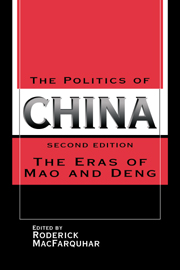Book contents
- Frontmatter
- Contents
- Preface
- List of tables and maps
- List of abbreviations
- Introduction
- 1 The establishment and consolidation of the new regime, 1949–57
- 2 The Great Leap Forward and the split in the Yan'an leadership, 1958–65
- 3 The Chinese state in crisis, 1966–9
- 4 The succession to Mao and the end of Maoism, 1969–82
- 5 The road to Tiananmen: Chinese politics in the 1980s
- 6 Reaction, resurgence, and succession: Chinese politics since Tiananmen
- Appendixes: Leaders and meetings
- References
- Index
5 - The road to Tiananmen: Chinese politics in the 1980s
Published online by Cambridge University Press: 05 June 2012
- Frontmatter
- Contents
- Preface
- List of tables and maps
- List of abbreviations
- Introduction
- 1 The establishment and consolidation of the new regime, 1949–57
- 2 The Great Leap Forward and the split in the Yan'an leadership, 1958–65
- 3 The Chinese state in crisis, 1966–9
- 4 The succession to Mao and the end of Maoism, 1969–82
- 5 The road to Tiananmen: Chinese politics in the 1980s
- 6 Reaction, resurgence, and succession: Chinese politics since Tiananmen
- Appendixes: Leaders and meetings
- References
- Index
Summary
INTRODUCTION
By the time the Twelfth Party Congress met in September 1982, China's new leaders had done much to overcome the post-Mao crisis of confidence. They had repudiated Mao's Cultural Revolution, renounced his economic theories, and reinstated his purged opponents. But acknowledging past mistakes was one thing; charting a viable course for the future was quite another. Although members of the reform coalition forged by Deng Xiaoping could agree among themselves, in principle, on the need for economic reform and opening up to the outside world, they differed over just how far and how fast to move toward revamping the basic ideology and institutions of Chinese socialism. Most important, they differed over precisely how much “bourgeois liberalization,” if any, could be countenanced in a society that continued to call itself Marxist–Leninist.
Sometimes, disagreement took the form of arcane academic debates over such issues as the special characteristics of China's “spiritual civilization” or the relevance to China of such foreign concepts as “universal humanism” and “alienation.” As often as not, academic debates served to mask highly contentious policy disputes – for example, over the tolerable limits of free market activity and private accumulation of wealth, the severity of the problem of “spiritual pollution” posed by the influx of Western cultural influences, and the proper boundaries of free expression for artists, writers, and other creative intellectuals whose contributions were deemed essential to the success of China's modernization drive.
- Type
- Chapter
- Information
- The Politics of ChinaThe Eras of Mao and Deng, pp. 340 - 471Publisher: Cambridge University PressPrint publication year: 1997
- 9
- Cited by

